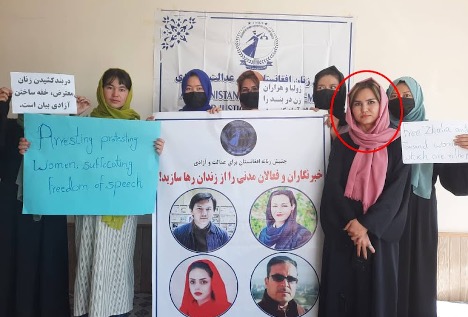Today is the International Day to End Violence Against Women. The Taliban’s regime of gender apartheidcontinues to stifle women’s rights and voices. The Australian Government has removed human rights defenders from their list of criteria for priority processing from the country our military and aid workers spent decades working to improve alongside their Afghan allies and friends.
Recent reports confirm the arrest of at least two young women advocates championing the rights of their fellow women in Afghanistan. Additional cases likely exist involving activists who have disappeared without any public attention.
Parisa Azada, an active member of the Afghanistan Women’s Movement for Justice and Freedom, left home at 7am to join another protest with women from Bamiyan Province.
For two days before her arrest, Parisa had been receiving concerning calls from unknown numbers. She sensed what was coming and asked her friends and circle of activists to raise a voice for her in case she went missing.

Parisa Azada at a protest. The text says: “Detaining protestor women is suffocating free speech”. Photo: Zolfa Behnia from 8 am Daily. Posted with permission.
Around 9am, after printing the banners for the day’s protest in a shop in Kabul, she called her friends and told them that she thought she was being followed by a black car. She was in Sarkariz, in Kabul’s Police District 3. Fear spread through the group of protestors as Prisa did not show up at the protest, and that night she did not come home. Her brother received a short call from the Taliban, who told him they had his sister but didn’t even specify where she was being held.
Parisa has been missing since the 15th of November. Her family has been unresponsive to her friends and is under the Taliban’s surveillance. She’s a 24-year-old woman from Bamiyan in central Afghanistan whose friends describe her as funny, smart, and kind. Parisa had been involved with the Afghanistan Women’s Movement for Justice and Freedom for several years. She attended many public protests, including against the Taliban’s strict dress code for Afghan women and the detention of journalists and human rights activists.
The Afghanistan Women’s Movement for Justice and Freedom works on a range of women’s rights issues, including violence against women and free speech. The organisation has over 150 members from different provinces of Afghanistan. They’ve managed more than 70 protests and lawsuits for women’s rights since January 2022.
Arghawan Farahmand* reported on the arrest of Parisa and other women’s rights issues. Like other female journalists in Afghanistan, she works in hiding. She’s been working with the 8am Newspaper (Hashte Sobh Daily) for over two years now. Arghawan explained, “I have shared so much with Parisa and I am afraid that my work will be held against me”
Arghawan and Rahila went to university with Parisa. They know her well. Rahila was once a cheerful, motivated leader who started an organisation called GirlUp, an NGO in Kabul that actively worked against gender-based and sexual violence by raising awareness and advocating for women’s right to education and equal access to opportunities. She is now spending her days in hiding and in constant fear of being arrested, just like her friends.
The circles of women activists and protestors are closely connected; concerns are increasingly haunting all women who have advocated for gender equality in any way. “I am worried that they will torture her, and she will lead them to us,” Rahila said.
There are other brave women like Parisa, Arghawan and Rahila with significant ties to Australia who have applied for humanitarian visas.
Azadi-e Zan works with a range of women’s rights defenders who have been fleeing the Taliban. The Australian Government refuses to grant visas to people who are inside Afghanistan. Many families flee to neighbouring countries like Pakistan and Iran, where the authorities also abuse their human rights. They exhaust any savings they may have had waiting for visas to come for places like Australia.
It is likely, if they arrived on medical visas, they won’t be able to have their visas renewed after changes to Pakistan Government policies. Other visa categories are also difficult to get and incredibly expensive. They can wait indefinitely for registration with UNHCR and still receive no material or practical assistance.
Now, the interim military Government of Pakistan is undertaking widespread deportation operations, sending incredibly high-risk women’s rights defenders back to Afghanistan without a second thought.
Two such families who have been waiting for Australian humanitarian visas for years include Benafsha Bahar* and Zainab Hussaini*.
Benafsha was a law professor at Al-Bironi University and ran a pro bono family law clinic helping women escape domestic violence. She experienced specific direct threats from the Taliban when she helped a woman escape an abusive marriage to a Talib. Now she, her husband and children are waiting for the Pakistan police to return to their door and send them back to the Taliban.
Zainab, 18, is a young activist involved in the Australian Sisterhood Program, connecting young Australian and Afghan women for cross cultural exchange and to discuss the advancement of women’s rights. Zainab worked in her school as an environmental activist since 2016 and attended street rallies protesting the Taliban and the Hazara genocide. She has participated in a range of workshops, including with the Afghan Women’s Network, on gender equality and girl’s education.
- Picture at top: Parisa Azadeh holds a sign that says: “Stop violence against women”. Photo: Zolfa Behnia from 8 am Daily. Posted with permission.
The post Taliban’s gender apartheid tightens, suppressing women’s rights, appeared first on BroadAgenda.
This post was originally published on BroadAgenda.